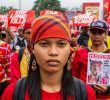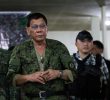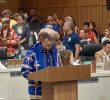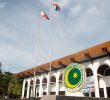Recently, we received word of former President Duterte’s vehement criticisms directed at incumbent President Bongbong Marcos. This speech took place at a rally in Davao City on January 28, the stronghold of Duterte’s supporters (DDS), strategically organized to counter the launch of Marcos’ program, Bagong Pilipinas.
During his address, Duterte not only condemned the People’s Initiative and the current administration’s efforts to amend the constitution but also resorted to his characteristic style of below-the-belt remarks. Among these, Duterte accused Marcos of drug addiction and cocaine use, hitting hard with his trademark sharp rhetoric.
Duterte also leveled accusations against the incumbent president and his family, suggesting their intention to manipulate the constitution to extend their stay in power, even describing the first lady as power-hungry. Furthermore, Duterte’s remarks hinted at the military and police, urging them to uphold the constitution against what he portrayed as a move instigated by the drug-addled leadership in Malacañang Palace, implying a veiled call for destabilization.
However, what does this spectacle truly reveal? Can we lend credence to Duterte’s sudden defense of the constitution against attempts to alter it? Certainly not. Prior to his presidential candidacy, he traversed the archipelago campaigning for Federalism, thus a constitutional change. During his own presidency, Duterte pursued but ultimately failed in his own bid to amend the constitution establishing a consultative committee which proposed the so-called “Bayanihan Constitution.” What emerges from this scenario is a clear fracture within the UNITEAM alliance that propelled both Bongbong Marcos and Sara Duterte to positions of power.
Even in the absence of Duterte’s outspoken criticism, it is evident that the Marcos family harbors a desire for prolonged political dominance. Duterte’s remarks simply brought this agenda to the forefront, particularly considering Sara Duterte’s aspirations for the presidency, widely speculated to be a condition or understanding within the UNITEAM coalition.
The proposed charter change, aiming to extend the terms of congressmen and potentially usher in a parliamentary system with Speaker Romualdez or presidential son Sandro as Prime Minister, appears to sideline Sara’s political future. Moreover, a conspicuous move by Congress to strip the proposed 650 million peso confidential and intelligence funds from the Vice President’s office and the Department of Education—both under Sara Duterte’s purview—seems like a deliberate attempt to hinder the Dutertes from accessing campaign funds sourced from public coffers.
In this realm of political maneuvering, a shift has likely occurred among those who once staunchly supported Duterte in 2016, only to see others transition from DDS to loyalists in 2022. While the die-hard loyalists persist, faithfully following their leaders whether in the north or south of the Philippines, a segment of the populace may now find themselves disillusioned and grappling with the current state of affairs.
Many of our overseas Filipino workers (OFWs) and their families were swayed by campaign promises and slogans touting supposed benefits for Filipinos at home and abroad. However, this pattern is not new. From the labor export policy initiated by the late dictator with his Bagong Lipunan era to the present Bagong Pilipinas under the incumbent president, the government continues to heavily rely on remittances from OFWs.
While some political analysts view the current political friction as an opening for the opposition, they also acknowledge the absence of a significant opposition presence, reflecting the reality that the Philippines is dominated by political clans rather than robust political parties. With the Aquinos fading from prominence and the resurgence of the Marcoses, the Duterte clan appears to be the primary emerging force at the national level, a prospect that many find concerning.
But does this mean all hope is lost? Absolutely not. What we truly need is not merely a change in the constitution but a transformation of the entire system. Fortunately, we possess a national democratic movement advocating for a comprehensive agenda to tackle the Philippines’ myriad social, economic, and political challenges.
Central to this movement is the implementation of agrarian reform to empower landless farmers and agricultural workers, coupled with a push for national industrialization to foster self-sufficiency and generate employment opportunities domestically. Prioritizing social justice through progressive taxation, safeguarding labor rights, and ensuring universal access to education and healthcare are paramount. Additionally, asserting national sovereignty against external interference and exploitation is crucial.
Ultimately, we Filipino people are the ones who wield the power to effect meaningful change, not the entrenched political clans or opportunistic and unscrupulous politicians.
The Right Reverend Antonio Ablon of the Iglesia Filipina Independiente is presently the Chaplain of St. Catherine’s Anglican Chaplaincy in Stuttgart, Germany of the Diocese in Europe, Church of England. He is a former chaplain to the seafarers in Hamburg, Germany and Bishop of IFI Pagadian.
duterte, marcos, uniteam








